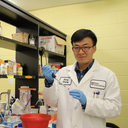Paris saponin VII inhibits growth of colorectal cancer cells through Ras signaling pathway.
Từ khóa
trừu tượng
Dysregulation of the Ras signaling pathway plays a key role in the progression of colorectal cancer. When bound to GTP, Ras is activated and stimulates several downstream effectors' pathways, including the Raf/MEK/ERK kinase cascade, the PI3-kinase/AKT/mTor pathway, and the Ral GTPase pathway. Saponins extracted from Liliaceae family herbs have strong antitumor activities with low toxicity. In this study, Paris saponin VII (PSVII), isolated from Trillium tschonoskii Maxim., was evaluated on human colorectal cancer cells (HT-29 and SW-620), a mouse model of colitis associated colorectal cancer (CACC) and a murine model of xenograft tumor. It was found that PSVII inhibited colorectal cancer cell growth in a concentration-dependent manner. The IC50 values of PSVII for growth inhibition of HT-29 and SW-620 cells were 1.02 ± 0.05 μM and 4.90 ± 0.23 μM. It could induce cell apoptosis, together with cell cycle arrest in G1 phase, and trigger apoptosis in a caspase-3-dependent manner. PSVII-induced growth inhibitory effect was associated with disturbance of MAPK pathway by down-regulating MEK1/2, ERK1/2 phosphorylation, and suppression of AKT pathway by reducing AKT and GSK-3β phosphorylation. In the CACC mouse model, PSVII protected mice from intestinal toxicities and carcinogenesis induced by 1,2-dimethylhydrazine (DMH) and dextran sodium sulfate (DSS). In the model of xenograft tumor, PSVII remarkably decreased the xenograft tumor size and triggered the apoptosis of tumor cells. Both in vitro and in vivo study showed that PSVII inhibited Ras activity. Taken together, PSVII might be a potential therapeutic reagent for colorectal cancer through targeting Ras signaling pathway.



